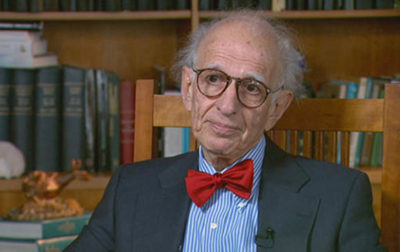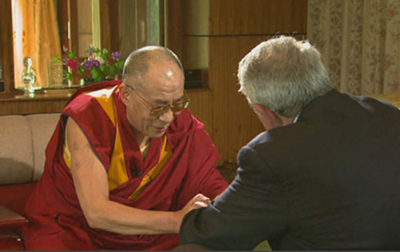What do the Dalai Lama and Eric Kandel have in common? They are deeply interested in neuroscience. Each met with prominent journalist Dan Rather to discuss the winding paths that brought them to scientific research for a new series of videos, Conversations in Science with Dan Rather.

Eric Kandel during his Conversations in Science interview
"It's really like someone just stumbled upon an interesting dinnertime conversation at the same table with Dan and an eminent scientist, or someone who cares about science, and was allowed to listen in," explained Elliot Kirschner, executive producer of the series created by iBiology and the Lasker Foundation.
Kirschner and Rather have worked together for almost 20 years, so when Kirschner approached Rather with the idea of filming comfortable conversations to personalize and humanize the pursuit of science, Rather jumped on board immediately. "Too much of science in the public is 'what's the latest breakthrough?' Often, it's overhyped," Kirschner said. "What we really try to get at is the process of science, the idea of really searching for the unknown, of following your streams of curiosity and standing in awe of nature."
In September, the team published the neuroscience interviews with Kandel and the Dalai Lama. Kandel spoke about his childhood and how the Nazi occupation of Austria eventually steered him toward a career in science. He described how his desire to understand the changes he saw in people around him during his youth led to studies of history, literature, and psychology before he realized that he was fascinated with laboratory work. He and Rather also chatted about some of the foundational principles of learning and memory that Kandel discovered over the course of his research career.

The Dalai Lama speaking about neuroscience with Dan Rather
"No one understands their own science better than the people who do it," Kandel said. "The best thing is to have the scientist speak directly to the public. That's not so simple because the newspaper person has learned how to communicate with the public. The newspaper person has learned what people know and what they don't know, and they translate what people don't know into language they understand. Scientists don't have that experience."
Kandel strongly advocates for scientists to close that gap through practice, training, and accepting interview invitations. He saw such an opportunity when speaking with Rather, a skilled and sympathetic interviewer able to facilitate telling accurate and clear stories of science.
In the second neuroscience video, the Dalai Lama discusses collaborative studies between the Tengboche Monastery and researchers from the University of Victoria and the University of British Columbia, Okanagan. This team showed that emotion affects the immune system and that brain activity changes long term in monks who meditate on positive emotions. The Dalai Lama hopes that collaborating with researchers to conduct these and similar studies will produce insights that benefit individuals and society as a whole.
These videos are presented for a layperson audience as part of the larger Conversations in Science project, which also includes an interview with Shirley Tilghman published in October and interviews with Paul Nurse, Jennifer Doudna, Daniel Colón-Ramos, and other prominent scientists.
